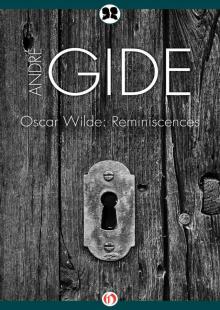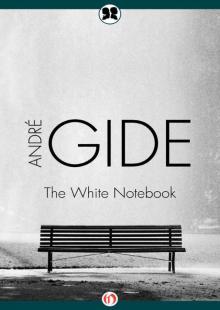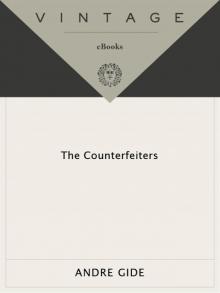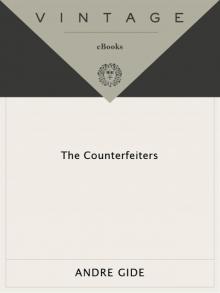- Home
- André Gide
The White Notebook Page 2
The White Notebook Read online
Page 2
And so many others still—and all the others.
* * *
Acknowledging our common aspirations, we went on to Vigny, Baudelaire—to Flaubert, the friend long anticipated!13 We marveled at his masterful rhythm. The rhetorical subtleties of the Goncourts sharpened our minds; Stendhal made them more receptive, more critical.…”14
ΣYMΠAθEIN: to suffer together, to be impassioned together.
I saw the Sphinx as it fled toward Libya; like a jackal it galloped along.
Loudly I declaimed it, developing first the line and then emphasizing the dactyl. Both of us trembled to the majestic cadences.
You wrote that T*** reread to us the other evening Du Camp and Flaubert’s Eastern Voyage. He recited for us the rhythmical apostrophe that we love, but whether he reads it for us or I read it myself, the voice that I hear is always yours.
* * *
We were still reading from the Temptation:15
O Fantasy, bear me away on your wings to mitigate my sorrow.. . Egypt! Egypt! The shoulders of your great motionless Gods have been bleached by bird-droppings, and the wind that passes over the desert stirs the ashes of your dead!… Spring will return no more, O eternal Mother!
… You cannot imagine the long journey that we have taken. The green courier’s onagers died of exhaustion.…
And we read much more until finally we tired of repeating the passages, of bringing out all their harmony, of letting the pulsating rhythms echo back and forth until the refrain clung to the lips of one of us and was intelligible to the other—in the absence of speech.
* * *
I related to you my aspirations; you smiled, trying your best to seem incredulous.
“And the book that I have been dreaming of writing,” I told you, “will be called ALLAIN.”
Allain, the book that I dreamed of writing! I saw it as a melancholy and romantic work at first, when with the stirring of my senses I roamed the forests in search of solitude and was prey to unknown anxieties; when the song of the wind in the swaying pines seemed to give voice to my resurgent yearnings; when I wept over falling leaves, over setting suns, over vanishing streams of water; and when at the sound of the sea I would lapse into a day of revery. Then I saw it as metaphysical and profound when my mind began to harbor doubts—childish doubts, perhaps, but doubts that caused me considerable anxiety. There cannot be two ways of doubting.16
At the outset I saw the book as a character sketch with neither episodes nor plot.
Then I had the notion of studying our love rather than portraying a character who declaimed about such things, and of recreating the intensity and immediacy of our experience.17
25 April
They will never understand this book, those who search for happiness. The soul remains unsatisfied; it falls asleep amid happy surroundings. It becomes inert rather than alert. The soul should remain alert, active. It should find happiness not in HAPPINESS but in the awareness of its violent activity.
It follows that sorrow is to be preferred over joy, for it quickens the soul; when it does not vanquish it stimulates. It causes suffering, but pride of undaunted living compensates for minor lapses. Supreme arrogance is the mark of intense living. I would not exchange the intense life for any other; I have lived several lives, and the least of these was the real one.18
My life will be more intense, my soul more vigilant. My listless soul will no longer lament but will rejoice in its nobility.
* * *
The thrill, both moral and physical, that grips you at the sight of sublime things, the thrill at first considered unique by each of us with the result that neither mentioned it to the other—what joy when we discovered that it was the same in both of us! It was an overwhelming emotion. What joy, afterwards, to experience it together as we read; it seemed to unite us in the same surge of enthusiasm. And the same thrill was soon felt by each of us through the other, in the other; with our hands joined and our bodies in close contact, we became inseparably one.
And when we read and my voice alternately rose and fell, I knew the sounds and the passages which we loved and which would make us both quiver with delight.
Fools! Nor would you have believed me …
Scamander, Meander, beloved of the Priamides.
The names alone, the Greek names with their long endings, awakened in us such magnificent memories that each burst of sound aroused latent feelings of exaltation.
One summer evening we were returning from H***.
We had been left alone on top of the carriage. The others were inside. The route was long and night was coming on rapidly. We wrapped around us a common shawl; our cheeks almost touched.
“I have brought along the Gospel,” I said to her. “If you wish, we can read together while there is still some light.”
“Read,” said Emmanuèle.19
After I had finished reading to her, I asked: “Shall we pray together?”
“No,” she answered. “Let’s pray silently. Otherwise we would think of ourselves rather than of God.”
We fell silent, but I was still thinking about you.
Night had fallen. “What are you thinking about?” she asked. And I recited:
Friendly dawn sleeps m the valley.…
Then it was her turn:
Farewell, leisurely voyages, sounds beard from afar.
Laughter of the passer-by, screeching of axle-tree,
Unexpected turns along irregular slopes,
A friend rediscovered, hours whiled away,
Hope of arriving late in some wilderness.…
Then mine again:
But you, indolent traveler, will you not
Put your head on my shoulder and dream?
And because it was growing late, both of us fell asleep, lost in dreams, our bodies in close contact, our hands joined.…
… Then suddenly a brutal awakening as if from a dream: we had run into a wagon on the dark road. We heard voices and the rattling of chains but saw nothing. We heard the barking of dogs and noticed a faint light outlined against the panes of a nearby farmhouse—or so we thought. Trembling a little, we drew even closer to each other, put our trust in each other.
Dreaming of black, heavy wagons that noisily by night
Pass by the thresholds of farms
And cause the dogs to bark in the dark.
While we slept the lanterns had been lighted. We watched with amusement for the indistinct shapes of bushes to leap from the shadows as we passed by. We looked for known shapes which would tell us how far we had to travel.
Then the sound of footsteps: a belated traveler suddenly illuminated by a gust of light. And as the rays moved on through the darkness they silhouetted the shadows of night butterflies as they approached and collided with the panes in the lanterns.
I recall the warmer air that caressed our brows as we crossed empty fields and smelled the perfume of damp plowed ground. We listened to the singing of the frogs.…
Then at last the arrival, laughter once again, the hearth, the lamp and warmth-giving tea. But both of us kept in our souls the memory of a deeper intimacy.
Not the landscape itself, not the emotion caused by the landscape. The setting of vanished suns, the peacefulness of dusk still floods my soul. O the peacefulness of beams of light on the plain!
Soon after the meal we ran to the pond; it became iridescent as it reflected the clouds.
At L*** M***, you remember, we would go at nightfall as far as the menhirs. Belated harvesters sang to each other as they made their way homeward on burdened carts; then their songs faded away in the distance. Crickets chirped in fields of wheat.
For a long time we would watch the darkness spread across the violet sea and rise like a tide from the depths of valleys, gradually blotting out all shapes. One by one on distant slopes lighthouses began to glow, and one by one in the distant sky the stars grew brighter. As we made our way homeward, Venus twinkled, caressing our eyes with her friendly light.…
And the
night was descending on our ravished souls.20
In the morning you attended to your housekeeping chores. I watched as you passed through the long corridors in your white apron; I waited for you on the stairway, at the kitchen doors; I enjoyed helping you and seeing you at work; together we went up to the huge linen-room—and sometimes while you put away the linen I followed you about, reading a selection previously begun.
Then I called you Martha, for you were preoccupied with many things.
But in the evening it was again Mary, for after you were freed from the cares of the day, you again became contemplative.
… You had been assigned to Lucie’s room.21 It seemed that the dear departed one had not completely vacated it. When you moved in, the things that had once been hers seemed to recognize her and to come to life again. I saw everything as it had once been: the table, the books, the large curtains that darkened the bed, the chair where I came to read, the vase with the flowers that I had picked for you.… In the midst of all that you seemed to be reliving a former life, a life that had already been lived. Particles of her memory surrounded you, making you more pensive. In the evening I saw her profile in the blurred silhouette of your bowed head, and your voice reminded me of her whenever you spoke. And soon both of your images became blurred in my memory.22
They had faith in us and we in each other; we had adjoining rooms.
Do you remember the lovely evening when I returned to you after we had said good night to them?
(August, 1887)
“Sleep claims all that surrounds us and through the window opened to the stars on this summer night come the sporadic cries of nocturnal birds or the rustling of moist leaves driven by puffs of wind, as soft as a lover’s whispered words.
“We are alone in your room, overcome by tenderness and passion. In the caress of the air, in the smell of hay, of lime-trees, of roses; in the mystery of the hour, in the calm of the night, something ineffable causes tears to flow and the soul to escape from the body and to coalesce in an embrace.
“One against the other, so close that we are embraced by the same shudder, we magniloquently extoll the May night, then when nothing more remains to be said, we remain silent for a long time and watch the same star, believing that the night is infinite and letting the tears on our cheeks flow together and fuse our souls in an immaterial embrace.”23
Rising earlier than the others, we would hasten to the woods on sunny days. The forest shimmered with cool dew and the grass sparkled in the sun’s rays. In the valley deepened and etherealized by the haze, everything was wondrous. Everything breathed new life and extolled the new day: our souls were lost in reverence.
Stimulated by our intoxication with these things, we longed to see the sunrise—a vain desire since the days were long. I came at daybreak and tapped softly on your door; you were only dozing; you arose and dressed hastily. But the house was still asleep, all the doors were closed, and we were unable to leave.
Then in your room with the window open to the cool dawn, and our bodies slightly chilled even though pressed closely together, we watched the last stars fade away and the tinged haze appear. Then when its crimson turned to brightness under the sun’s first rays, morning songs echoed through our giddy, empty heads and we went back to sleep, intoxicated by our joy.
Tuesday
Multiply emotions. Not just one life in one isolated body; make your soul the host of several bodies. Feel it vibrate to the emotions of others as well as to your own and it will forget its own griefs when it ceases to think only of itself. The outer life is not violent enough; more poignant tremors result from inner surges of rapture. Let it feed on admiration; then it will be haughtier and its vibrations stronger. Not realities but chimeras, for the poet’s imagination brings out more clearly the ideal truth hidden behind the appearance of things.24
Let the soul never fall back into inactivity; it must be nurtured anew on surges of rapture.
(1887)
Plan of Conduct25
Freedom: reason denies it. Even if it did not exist, still we would have to believe in it.
We are shaped by definite influences: we must therefore discern them.
Let will be dominant everywhere: we should do as we please. We should choose our influences.
Let everything serve to instruct me.
(3 June, 1887)
“I wanted to speak of many things, but everything besieges me. I wanted to devote some attention to my Symbolism which is now taking shape, but then came the memory of Notre-Dame and the white-robed children’s choir seen by lamplight behind the railings of the main altar. The children were all singing and their voices were clear, creating the impression of an angelic choir; a minor cadence, relentlessly repeated and always unexpected, rose to the top of the vault. I also wanted to speak … but my thoughts drifted aimlessly, borne along by the melody of a quartet recently heard. I write because poetry overflows my soul and vainly seeks expression through words. Emotions transcend thoughts … and yield pure harmony.
“… Then words, disconnected words, tremulous sentences, something resembling music.
“It is midnight and I am sleepy but unable to sleep, for I am consumed by love. Everything around me sleeps; I am alone and I weep. The air is warm and it is raining outside—a spring rain that make all nature fruitful. And the air played on the cello and remembered during the night assuages my delirium, lulls, soothes, consoles. Thoughts of grief, of madness, of love, of ecstasy are lost in restful sleep.…
“… Submit, my soul; weep and pray for a long while as sweet night brings intoxication. Weep and submit, my soul. Pray.”
(1887)
“… Or flesh in disguise. Rotten flesh! It appears everywhere in disguise.
“Consider the source of poetry … writhings of desire and nerves vibrating to the fascination of colors because of a small quantity of fluid dispersed throughout the body! Oh, what prose, what sordid prose at the bottom of it all!
“But such is responsible for the flower, the supreme poetry of the plant. Here diapered petals unfold themselves beneath erect stamens, like a sumptuous bed of unconscious delights. O poet’s unconsciousness! blindness! vain belief in an inspiring Muse! Puberty excites the poet, making him wander about on starry nights under the illusion that he is extolling the ideal … until verses elude him. Then the stream of poetry that overwhelms him is converted into orgies in the arms of a courtesan.
“The derivative is indeed sublime! Indeed, it makes man think of himself as God! Beautiful, moonlight nights that evoke pure poetry (Musset)… but dogs also bay at the moonbeams!
“What is pure and what sullies cannot be known, for the connection between the two essences is so subtle and their causes so intermingled that a vibration in one is manifested in the other. An abundance of blood makes a generous heart. If Swift had known love, he might have written psalms.… And you tell me, friend, that I should not worry about my body but should let it pasture in the fields that it covets. But the flesh corrupts the soul, once it has been corrupted! New wine cannot be put into rotting vessels! The flesh lays claim to the soul unless the soul wins control at the outset. The soul must be the master and not the slave.26
“Then I am romantic because my blood pulses within me.… Even so, the illusion of the ideal is good and I wish to preserve it.”
(Poubazlanec, Sept., 1887)
“Your advice is striking, O Ar***. And so is your theory! ‘Free the soul by giving the body what it asks!’ you say. And you would hold me in even higher esteem if I did.… But friend, the body would have to ask for what is possible; if I gave it what it asks, you would be the first to raise a hue and cry; besides, could I satisfy it?27
“Your complacency is also striking! ‘The struggle naught availeth,’ you said to yourself. ‘The soul must not exhaust itself in unworthy conflicts.’ Yielding beforehand, you spared yourself the effort. But you must know that gangrene of the flesh infects the soul. No desire of mine fails to reverberate throughout my
soul.
“And you set yourself as an example. Certainly, I admire you. Your outlook is broad and you take life as life will probably take me eventually. But what I have not told you, what you must never learn lest your serenity be disturbed, is the complete shattering of my dreams when you, obviously disillusioned, told me all this. Oh, I had placed you on a higher plane! And tears on my wounded pride whose futility I suspected for the first time! Disgust bordering on nausea on looking at life, the life that must be lived! I prefer my dream. My dream!28
“You smiled as you said these things and I smiled as I listened, but I no longer understood your words. One thought alone made tears flood my heart: ‘He returned to the girl and was not recognized by her.’
“Not recognized! Lord, is it possible? My heart ached throughout the night. Why this sadness? Such things must be. Why should she have recognized him? She had seen so many afterwards, and features inexorably fade from memory.
“But he had given you everything! Did you know? Had he dared tell you? How depressing is all this, how depressing! Fie! If this is the life that must be lived.…
“I prefer my dream, Lord! I prefer my dream.”
(July 1887)
“I detest their advances, their whispered or subtly intoned words, their ghoulish or siren voices—I detest everything about them.
“And when I walk down the street, I leave the sidewalks and quickly take to the pavement. From a distance I see them turning, pacing back and forth … and their gestures, their supposed designs forever intrigue me. I would like to find out.…
“It was two years ago and it was for the first time. As a matter of fact it was the only time, for now I am careful and walk at a distance from them. One was singing a sad refrain; a little mockingly but tenderly, and with such a thin, weak voice.… As I passed near her she turned around and made a sign, without stopping her singing.
“It was the first time, one of the first nights of spring. The air was warm and the melody nerve-racking.… Tears filled my eyes. I could not help turning and running away. She laughed shrilly and another one who was loitering nearby called out: ‘There is nothing for you to be afraid of, pretty boy.’ The emotion was so violent that I thought I would faint; blood rushed to my face; I blushed from shame, from shame for them; I felt that I had been sullied by the mere fact that I had heard their words. My temple throbbed, my eyes were dimmed by a flood of tears. I ran away.

 Oscar Wilde
Oscar Wilde The White Notebook
The White Notebook The Counterfeiters: A Novel
The Counterfeiters: A Novel Urien’s Voyage
Urien’s Voyage The Pastoral Symphony
The Pastoral Symphony The Counterfeiters
The Counterfeiters Urien's Voyage
Urien's Voyage